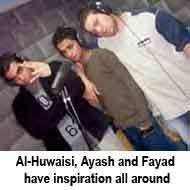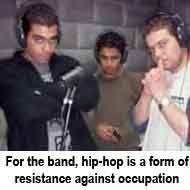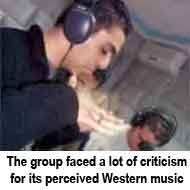Rap finds new voice in occupied Gaza
Rap finds new voice in occupied Gaza
© 2003 - 2005 Al Jazeera by Laila El-Haddad in Gaza Tuesday 15 March 2005, 18:03 Makka Time, 15:03 GMT
http://english.aljazeera.net/NR/exeres/250D841C-87D6-4554-9A71-83D44ABBD539.htm
Far away from its roots in the Bronx of New York, rap is finding a new voice as a group of young Palestinians sing about the frustrations of life under occupation in the Gaza Strip.

As I enter the small sound-proof recording room in central Gaza, I am greeted by something rather unexpected. It is music, yes. But not the usual, hip-shaking kind that one has become accustomed to hearing on the ever increasing Arabic satellite music stations. It is rap; it is potent; and it is in Arabic.
Sitting in front of the recording equipment is 22-year-old Nadir Abu Ayash, a member of Gaza's first ever hip-hip group PR (Palestinian Rappers), and who provides many of the song's identifiable background sounds - with no special effects.
"Rap is our way of resisting the occupation, it's our weapon," he explains timidly in a manner that seems incongruent with his gravelly voice and the harsh lyrics that blast out from the stereo speakers behind him.
"Do you remember, or do you choose to forget/ that your army, against us, aggressed/ My voice will continue to echo, you'll never forget/You call me terrorist, when I'm the one who's oppressed," he raps in one of their latest songs.
Alternative way
The band, which first starting rapping two years ago, believe that hip-hop provides them with an alternative way to voice their resistance to and frustrations with the Israeli occupation.

The young rappers, Nadir Abu Ayash, Mutaz al-Huwaisi (Mezo), Muhammad al-Fara(DR), and Mahmud Fayad (Bond), pour all their emotions into their work. And they don't need to go far for inspiration.
Abu Ayash lives in the refugee camp of Maghazi and all around are constant reminders of the Israeli occupation, whether by way of a demolished home, an orphaned family, or the enduring poverty that has taken hold over 57 years of dispossession.
Fellow band-member Muhammad al-Fara lives in one of the most volatile areas of the Gaza Strip, just 5km away from the refugee camp of Khan Yunus. Three years ago he was shot in the arm by Israeli snipers situated in one of the nearby Jewish settlements.
"With the situation and the events around us, it's not difficult to come up with songs. It expresses itself inside us. Whenever you are affected by something you see, you write," al-Fara said.
A few months ago, the group was unable to leave Gaza to perform at a concert in France because of an Israeli policy banning young men between the ages of 16 and 35 from traveling.
Like a prisoner
For al-Fara, it was devastating. "I was shocked. I was angry. So I began writing," he said. The result was a song in progress about the trials and tribulations Palestinians endure. "I am Palestinian ... I live like a prisoner, estranged in my own land during this time/for your sake Palestine, our screams have been silenced/our words have been denied/our movement has been paralysed."
Of course, singing in Gaza is not without its hurdles, both social and political. The most basic of these is simply being able to meet to record a song.
Commuting every day from Khan Yunus is a challenge in itself, as al-Fara must cross the Abu Huli checkpoint which tears the northern Gaza Strip from the south, a journey which could take over an hour on a good day.
The problem gets infinitely complicated if the group even considers collaboration with bands in the West Bank - an aspiration rendered all but impossible due to an Israeli ban on travel permits to the West Bank from Gaza and vice versa.
But the group does not intend to let physical boundaries stop them - they hope to record a song entirely over the internet in collaboration with a Palestinian rapper from a group called Zilzal in Israel.
Confused reaction
Predictably, the band faced a lot of criticism when first starting out.

"It was the first time people here heard something like this. They said they couldn't understand us - that we were speaking too fast, and they were critical of our dress and style of music because they perceived it as 'Western'," band member al-Huwaisi said.
"People were confused at first. But in the first concert we performed, the reaction was incredible - people of all ages were listening enthusiastically."
Attending the concert was Palestinian-American photographer and film-maker Jackie Salum, who is currently shooting a documentary about Palestinian rap.
Slingshot Hiphop focuses on the daily life of Palestinian rappers living in Gaza, the West Bank and inside Israel and aims to spotlight "alternative voices of resistance" within the Palestinian struggle.
Salum said she initially intended to cover Palestinian rap in the West Bank and Israel. She found out about the Gaza rappers by sheer coincidence - surfing the net one day and running into a site, http://www.arabrap.net/, on which al-Fara had posted a message about his group.
Forms of oppression
"The [show] was the most exciting part of the whole trip. It sort of defied these preconceived notions people have of Gaza, that they're so backward. For them, rap is a weapon against the occupation - they throw rhymes like others throw rockets," Salum said in an interview to Aljazeera.net from her Michigan residence in the United States.
The young rappers say they chose rap among other forms of music because of the flexibility it allows in composition, and because it best enables them to express their feelings about the many forms of oppression they face. According to Salum, it is this very style that strikes a chord with listeners.
"Rap as a genre is accepted and popular and has the potential to transcend global boundaries. Because it is so familiar, it is inviting and accessible to people. When people hear hip hop they immediately relate. People are really interested in hearing it, because it's the youth speaking and its coming from the heart," she said.
"People who have seen them rap in the film say... 'wow' ... they are just regular kids, regular guys, hoping to bring a human face to the conflict and change people's reactions."
The band members say they dream of one day meeting with all of the hip-hop groups in Palestine to rap together in a large concert. They would especially like to rap with the Arab-Israeli group DAM, who they consider their idols, and whose song "Who's the terrorist?" put them on the musical map.
Changing perceptions

They are hopeful it won't remain merely a dream. The lyrics of one their song declares, "the night is bound to leave and day will come upon us".
Palestinian-American film-maker Salum said: "Unfortunately, you see nothing [about Gaza] except when there's a suicide bombing. When you hear the word 'Gaza' the connotations are so negative. I've even been asked if their music is violent, and if they rap about suicide bombings."
Al-Fara says it is precisely these images he would like to change.
"People have this impression of Gaza youth - that we are very backward. We want to show them otherwise. Rap is the means by which we hope to channel our message to the world - about the freedom we yearn for, about the oppression we face, and about Gaza in general."